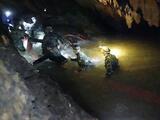If Trump kills Iran deal; what next?

Crédito: Ebrahim Noroozi/AP
TRUMP’S POSITION
Trump appears determined to scrap the deal and reimpose sanctions on Iran that were suspended in an accord reached in Vienna in July 2015. Trump believes that once the current agreement is revoked, Iran will come to the table to negotiate a new one.
Trump has termed the accord a “disaster” and “the worst deal ever” and vowed during the 2016 presidential campaign to kill it. Trump delayed action, in part due to resistance from members of his cabinet, including Secretary of State Rex Tillerson, and National Security Adviser, HM McMaster. Both men departed the administration in recent weeks. Trump’s new Secretary of State Mike Pompeo and the National Security Adviser, John R. Bolton, and both vociferous opponents of the nuclear agreement.
President Trump claimed that the 15-year deal was too short and that it failed to embrace Iran’s development of missiles and its support for terrorism around the Middle East. He called for new sanctions on Iran, directed against its Revolutionary Guard police force, and called on Congress to make the necessary changes to the U.S. terms.
IRAN 'S POSITION
It is unclear how Iran will react. It could defiantly relaunch its nuclear program, or it could take a wait and see approach, continuing to abide by the agreement.
President Hassan Rouhani has hinted Iran could work out a deal with other signatories, excluding the United States. "If we can get what we want from a deal without America, then Iran will continue to remain committed to the deal. But if not, Tehran will continue its own path," he said.
Iran’s foreign minister, Mohammad Javad Zarif has said Tehran will not renegotiate the deal. “If America leaves the nuclear deal, this will entail historic regret for it,” President Hassan Rouhani of Iran said in a speech broadcast live on state television in recent days.
THE DEAL
The 2015 agreement, known as the Joint Comprehensive Plan of Action (JCPOA), was struck between Iran, the United States, the European Union, Russia, and China. Iran agreed to cut back its nuclear activities in return for easing of international economic sanctions.
The agreement required the Islamic republic to ship about 97 percent of its nuclear fuel out of the country, and to halt production of new fuel for 15 years. Any violation of the deal, and U.N. sanctions would automatically "snap back" into place for 10 years.
In return, sanctions previously imposed by the U.N., U.S. and E.U. would be lifted. According to the deal, Iran stood to gain access to more than $100bn in assets frozen overseas, and could resume selling oil and trading other goods on international markets. (The sanctions cost Iran more than $160bn in oil revenue from 2012 to 2016 alone.)
In July 2015, Iran had almost 20,000 centrifuges, enough to make eight to 10 bombs, according to the White House. Under the deal it was limited to installing no more than 5,060 of the oldest and least efficient centrifuges for 10 years.
The International Atomic Energy Agency (IAEA) has verified that Iran has implemented its key nuclear-related measures described in the JCPOA. Iran's uranium stockpile is set to be reduced by 98% to 300kg (660lbs) for 15 years. It must also keep its level of enrichment at 3.67%.
CONSEQUENCES
European officials say that dismantling the accord would be a huge diplomatic error and could open the way for Tehran to resume making nuclear fuel.
It would inevitably strain U.S. relations with its European allies; principally the U.K., Germany and France. It is unclear if European nations could still move ahead with their economic relations with Tehran without themselves falling under U.S. sanctions.
On Monday U.K. Foreign Secretary Boris Johnson met with senior U.S. officials to urge the administration to keep the deal in place and negotiate new arrangements to fix its “flaws.” Appearing on Trump’s favorite morning news show, Fox & Friends, Johnson urged the president not to "throw the baby out with the bathwater."
In recent weeks President Emmanuel Macron of France and Chancellor Angela Merkel of Germany have visited Trump and They argued that if the United States withdraws, Iran could accurately claim that Washington was the first to violate the accord, and would be free, if it chose, to resume fuel production, according to diplomats who spoke on the condition of anonymity to discuss the sensitive negotiations.
“Now that these handcuffs are in place, I see no possible advantage in casting them aside,” Johnson wrote in The New York Times on Sunday. “Only Iran would gain from abandoning the restrictions on its nuclear program.”
Johnson, the UK foreign secretary, questioned what thinking had gone into what happens after the accord is terminated. "Plan B does not seem, to me, to be particularly well developed at this stage," he said.
There are two uranium enrichment facilities in Iran - Natanz and Fordo - where uranium is produced. In a low-enriched form it can be used as fuel, but it can also be enriched to produce nuclear weapons.
Johnson pointed out: "What if the Iranians do rush for a nuclear weapon? …. are we seriously saying that we are going to bomb those facilities?”



